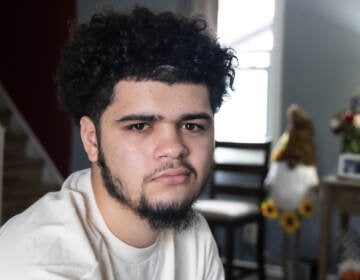Philly students on school safety walkout: What took you so long?
In Philadelphia, the kids have been on fire for years — and violence has been a constant theme.

Close to a hundred students and members of the Philadelphia Student Union held a six-minutes 'Die-in' protest on the steps of the School District's North Broad Street headquarters. (Bas Slabbers/for WHYY, file)
In Philadelphia, the kids have been on fire for years.
Walkouts are a student staple. Their fury over everything from budget cuts to overcrowded classrooms to teacher layoffs launches them out of their classrooms and into the streets with signs in their hands and chants on their lips.
Violence is a constant theme: Students have held die-ins, boycotts, and marches to demand an end to violence in their communities and at school, whether at the hands of police or others.
Then came Parkland.
A gunman shot 17 students and teachers to death at Marjory Stoneman Douglas High School in Parkland, Florida, last month, a tragedy that sent students from the school into activism overdrive. Their contagious rage led students around the country to plan Wednesday’s National School Walkout, in which kids will leave class for 17 minutes — one minute for each Parkland death — to demand lawmakers do more to protect the nation from gun violence.
For Philly kids, the activism ignited by the Parkland shooting is welcome — and long overdue. And that leaves many students with conflicted feelings about the walkout and the sudden avalanche of headlines about school safety.
“I’m happy that something is happening. But it’s sorta like, this has been happening so long. Did it take these white kids to tell you that something was wrong for something to happen? If so, why?” said Kaamil Jones, 18, a senior at Science Leadership Academy in Center City.
His classmate Tamir Harper agreed.
“I respect and support the students at Parkland. They are doing an amazing thing. We are happy to stand in solidarity with them. But we have many black activists who have been on the front lines fighting for these issues before. Without the young activists before Parkland, I don’t think their voices would have been as amplified,” Harper said. “And I do think their socio-economic class, the area that they’re from, gives them an extra boost.”
Julien Terrell, executive director of the Philadelphia Student Union, added: “The call for gun control is nothing new. But you’re seeing vastly different responses. If this was a shooting in a black and brown community, I wonder if there would be such widespread support.”
When black children staged a walk-out in memory of Mike Brown and against police brutality they were called thugs. White kids in Parkland staged a walk-out in protest of gun violence and were mostly praised.
I ask then, why should young black Americans care about America?
— Quiana Fulton (@thequianafulton) March 3, 2018
At Mastery Charter School’s Shoemaker campus in West Philly, activism is encouraged and taught, but even there, many students are ambivalent about today’s walkout.
“It’s not something our student body has demonstrated an eagerness to participate in,” teacher Zachary Wright said. “A student of color in my class could rightly say, ‘When’s the last time a white community walked out for me, because of all the daily murders in our inner cities? They haven’t.’”
Wright acknowledged that gun violence can be so common in some neighborhoods — Philly police handle well over 1,000 shootings each year — that it “dulls your sensibilities.”
Still, he pointed out that while white, suburban people might feel disconnected from the chronic, daily violence in inner-city communities of color, many black and brown city folks feel equally detached from the mass shootings that seem to only happen in white, suburban districts.
And that, Jones and Harper said, is why suburban school shootings have gotten more attention from journalists and lawmakers.
“So many politicians are white men, mostly older white men,” Jones said. “They don’t have the same experience we have. They don’t talk to black people that often.”
Because it is about race! We morn the victims of Columbine, Sandy Hook and Parkland (as we should). But where is the grief, the sorrow, the marches, the national media attention for black kids? Our black kids?
I ask again “Why it gotta be about race?— Christopher Bogart (@Christo34450160) March 3, 2018
The media, too, is predominantly white. That colors what journalists think is important to cover — and how they cover it, Harper noted.
“When we protest, and we make noise, they say we are rioting, we’re causing destruction, we are not doing this properly, we should go sit in a meeting with policymakers,” Harper said.
Jones agreed. “We’re seen as thugs and made to feel like criminals,” he said. “I feel like they’re seeing us as doing something wrong, rather than trying to be progressive.”
Activism by black and brown people also draws a harsher police response, both teens noted.
“I saw more police officers at Black Lives Matter protests than I’ve seen at the Super Bowl parade in Philadelphia,” Harper said, adding that such a disparate response “criminalizes black people for protesting.”
The time to talk about issues of race is *all the time.* Because it permeates *every single* aspect of American life.
So don’t tell me I’m conflating *separate* issues when I talk about how black kids protesting don’t get any of the support the Parkland kids are getting.
— Sonia Gupta (@soniagupta504) March 2, 2018
WHYY is your source for fact-based, in-depth journalism and information. As a nonprofit organization, we rely on financial support from readers like you. Please give today.




